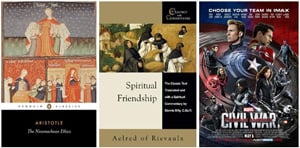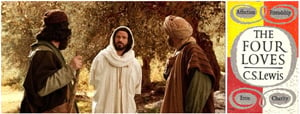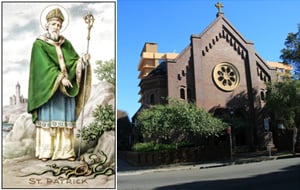HOMILY FOR 3RD SUNDAY OF EASTER + CENTENARY OF ST. PATRICK’S BONDI – ST PATRICK’S CHURCH, BONDI

HOMILY FOR 3RD SUNDAY OF EASTER + CENTENARY OF ST. PATRICK’S BONDI
ST PATRICK’S CHURCH, BONDI

People have reflected upon the meaning of friendship ever since the Book of Genesis described the first one – between Adam and Eve. Philosophers from Aristotle and Cicero through to Aquinas and C.S. Lewis all put in their two cents’ worth, as have spiritual writers like St Aelred of Rievaulx and St Francis de Sales.1 So, too, poets, song-writers and novelists have tried to capture the meaning and sentiments of friendship.
A recent example is the movie Captain America: Civil War. The title-role character is the alter ego of Steve Rogers, a frail young man enhanced by an experimental serum to aid the U.S. war effort. He has two mates: his childhood friend and war-comrade, James “Bucky” Barnes, now a brain-washed assassin; and an industrialist and master engineer, Tony Stark, whose powered exoskeleton has made him into “Iron Man”. Stark insists that Rogers must choose whether to be a friend to Stark or Bucky, but Rogers is unwilling to give up either. The movie ends with Stark reading a letter from Rogers, which says, in part, “My faith is in people, I guess. Individuals. And I’m happy to say for the most part, they haven’t let me down. Which is why I can’t let them down either… I know you were only doing what you believe in, and that’s all any of us can do, it’s all any of us should. So no matter what, I promise… if you need me, I’ll be there.”
True friendship, as the movie recognizes, is never forced, but freely given and received. While it might be based on admiration of some quality in the other, it doesn’t demand that the other be everything we want them to be; while it might be based on some shared ideals, it doesn’t expect the other to agree with us on everything. Rogers is prepared to defend Bucky in a righteous fight, even if this is against his other friend Stark: for a friend-in-need is a friend indeed and true friendship never requires us to do what is morally wrong. But as Rogers’ letter makes clear, whenever Stark needs him he will be there for him; he might have gone ahead on the path, but he would willingly drop back and walk with him.
Our Lord also models friendship for us today, walking with His two disciples on the road to Emmaus (Lk 24:13-35), gently helping them to enlarge their understanding and recognise their mistakes. But He does not force faith or friendship on them, even now He has risen victorious over death. So, when they reach the town, Luke tells us, ‘He made as if to go on’, letting them decide whether to press Him to stay with them. Jesus doesn’t force us to break bread with Him: He leaves us free to invite Him into our hearts and our Eucharists. Like Rogers, He’s willing to walk ahead when we choose to stop; but if we ask Him to stay, He will.

C. S. Lewis once wrote that “you will not find the warrior, the poet, the philosopher or the Christian by staring into his eyes… better fight beside him, read with him, argue with him, pray with him”.2 Captain America and Ironman are friends because they have fought together, struggled together, walked the road together. But as this morning’s Gospel makes clear, friendship is about more than taking the same route, engaging in some common task: the friendship Christ offered was deeply personal. The two disciples didn’t recognise Christ as they walked the Emmaus Road with Him; but their hearts began to burn as they spoke with Him, as they heard the Word of God from Him; and finally, it was at the Eucharist that they realised He was really present. Which is why the phrase ‘breaking bread’ with someone has come to mean more than merely eating with them; it is about sharing food for friendship sake. Only in such personal encounters do we discover who someone is; only by coming to know them, at least a little, can we befriend the real person rather than some mirage; and once we have befriended them we will get to know them more deeply. Knowledge and friendship, truth and love feed each other.
Jesus was a man to whom friendship came easily and if the Gospels are to be believed – and they are! – He loved to party. He was forever at wedding feasts, dining with Pharisees, taxmen or sinners, having intimate meals with His apostles or His friends Laz, Mary and Martha, or hosting picnics for five thousand or so in the hills. His first miracle was changing water into wine at Cana, His most recorded one the multiplication of loaves and fishes, and His last the miraculous haul of fish: all marked crucial points in His ministry and were all of end-time proportions – abundantly hospitable, magnificently extravagant.

Indeed, so important is breaking the bread of friendship in the Gospels that they often read like episodes of Masterchef or My Kitchen Rules. When Jesus preached He used images of vineyards, grapes and wine; wheat, yeast and bread; oil, mint, rue and other herbs, mustard seeds, figs, eggs, fish and a fattened calf. He parabled about party invitations and table manners, described prayer as asking for your daily bread, compared forgiveness to a prodigal father’s feast for his returned son, said Christian life is about bearing fruit and yielding a harvest. Christian leaders must preach with the savour of truth, give the household its food at the proper time, and feed the sheep. The kingdom of God is like a wedding party and the disciples will eat at Christ’s table.
How does Jesus describe Himself? “My food is to do the will of my Father.” “I am the Bread of Life.” And how does He leave Himself for us after His Ascension? His Body and Blood, soul and divinity, under the species of bread and wine. God-made-man becomes food – or, more accurately, food becomes the God-man, given for us. His passion was framed by that Last Supper at one end and by meals in the Jerusalem cenacle, on the Emmaus Road, and at the lakeside in Galilee at the other. While the Eucharistic sacrifice and the community of the parish are about so much more than eating with our friends, they start with those very human realities as “grace builds on nature”.
St. Patrick knew the importance of friendship. To convert the pagans of Ireland he had to do more than simply preach at them; he needed to live with them, pray with them, eat with them. As a result of his freely given friendship, thousands were baptised by his hand, and it was from that country that so many missionaries came, even to our own shores.
A hundred years ago, as a long and bloody war neared its end, the people of Bondi proclaimed their hope for something better, for peace and goodwill to all, by building a new parish with a new convent, school and church. They dedicated it to St. Patrick, as so many parishes had been in the spiritual colonies of the Irish – little knowing that the area would become something of an Irish enclave in the future. The present Romanesque church came later, when numbers warranted it, and was built as another statement of hope, this time amidst the Great Depression.

The craftsmanship of those early parishioners and devoted care of their successors are told in how well this old lady has withstood the decades. But the people of this parish, like their patron saint before them, knew that parishes need more than buildings: above all they need that invitation to fellowship with which Christ greets us all, “Peace be with you”. What has been celebrated for a century, Sunday after Sunday in the Breaking of the Bread in this parish, is the recognition: that Christ is with us in His word and sacraments; that only He can bring that so longed for in 1917, a peace the world cannot give; and that we must extend that friendship, peace, hospitality to the world. A century of parishioners have taken Christ from here to the world and brought the world back to Him here, as a foretaste of the centenary of centenaries celebration at the end of time: the wedding feast of the Lamb of God.
In meantime we need only open ourselves to friendship with God and our fellows, as St. Patrick did, to a lived celebration of all that is good and true and beautiful. This is the proof that we are walking the same road with Jesus; this is the evidence that our hearts truly burn within us as He talks to us in His Holy Scriptures; this shows that we have recognised Him in the Breaking of the Bread. Happy 100th birthday St Patrick’s Bondi! Many happy returns!
WORD OF THANKS AFTER COMMUNION
FOR CENTENARY OF ST. PATRICK’S CHURCH, BONDI
3RD SUNDAY OF EASTER YEAR A
My congratulations to Father Benton and to you all on the occasion of the 100th anniversary of your parish. I don’t expect to be around for the 150th, though I hope some of you will be! As I look out today at the many faces, young and old, that make up this parish, I know that this parish will be in good hands going forward. I rely upon the younger people here to remind others in 2067 about the celebration we had back in 2017. Perhaps one of the young faces I see here today may even be where I’m standing now! Though I said we are only promised the really big party at the end, that doesn’t mean we can’t have a pretty good party today! A very happy birthday to you all.
INTRODUCTION FOR 3RD SUNDAY OF EASTER + CENTENARY OF ST. PATRICK’S BONDI
ST PATRICK’S CHURCH, BONDI
Dear brothers and sisters, a hundred years ago this very month, Fr Michael Fitzpatrick celebrated his first Mass in the Josephite cottage that became the Wellington Street ‘church’ and so launched the parish. It is a great joy for me to be here this morning to celebrate the centenary with you. And I must say I think you are all looking pretty good for hundred year olds!
I acknowledge Fr Andrew Benton, the devoted Administrator of the Parish. I welcome Hon. Gabrielle Upton MP, Member for Vaucluse; Councillor Sally Betts, Mayor of Waverly Council; Sr Mary Ellen O’Donoghue RSJ and other Sisters of St Joseph; Mr Bill Harrigan, President, Waverley-Bondi Junction RSL, and other honoured guests.
As we begin our Mass today, we remember with gratitude all those who have built and served in this parish over the century past, and those who worship in it still or will do so in the future, commending them all to Almighty God.
1 Aristotle, Nichomachean Ethics, Bk VIII; Cicero, De Amicitia (On Friendship); Aquinas, “Treatise on Charity” in Summa Theologiae IIa-IIae qq.23-46; C.S. Lewis, The Four Loves; St Aelred, Speculum caritatis (The Mirror of Charity) and De spirituali amicitia (The Spiritual Friendship); St Francis de Sales, Treatise on the Love of God.
2 C. S. Lewis, The Four Loves, (1960), p. 104

